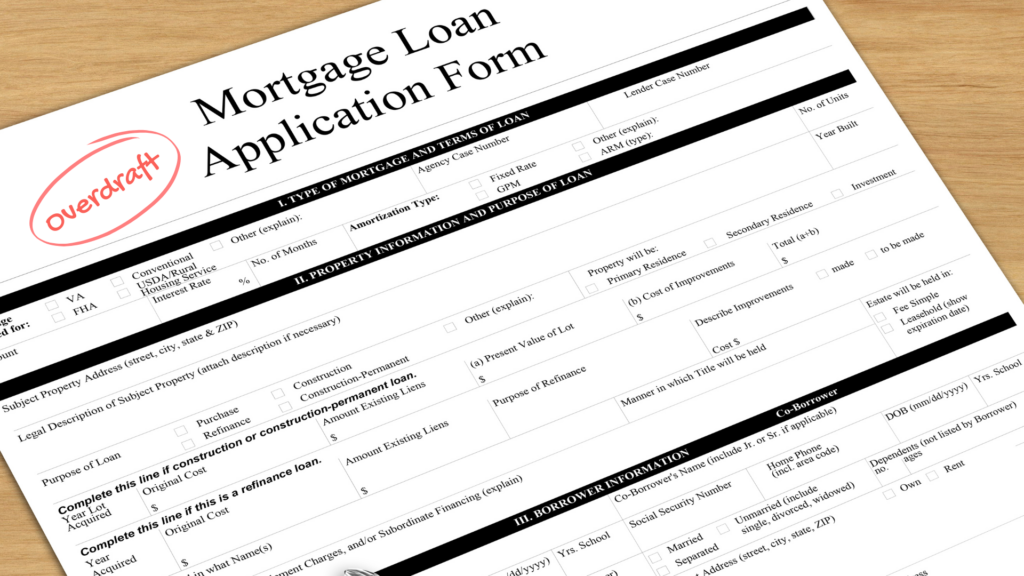- What is Debt-to-Income Ratio?
- Two Types of DTI Ratio
- Why is DTI Important?
- What Counts as Debt in DTI Calculations?
- What Doesnât Count as Debt?
- What is a Good Debt-to-Income Ratio?
- How Much Debt is Acceptable for a Mortgage in the UK?
- How Can You Improve Your DTI?
- What is the Loan-to-Income Ratio?
- Why Does LTI Matter?
- Key Takeaways
- The Bottom Line
Debt-to-Income Ratio: How Much Debt Is Too Much?

Want to own a house in the UK?
Before you start browsing property listings, there’s an important number you need to know: your debt-to-income ratio (DTI).
This little figure can make or break your mortgage application.
Don’t worry if it sounds complicated – we’ll break it down for you.
In this guide, you’ll learn what DTI is, why it matters, and how you can manage it effectively.
Knowing your debt-to-income ratio can help you figure out how much you can borrow and improve your chances of getting a mortgage.
Let’s get started!
What is Debt-to-Income Ratio?
Your debt-to-income ratio (DTI) shows how much of your monthly income goes towards paying off debts.
Lenders use this percentage to gauge whether you can comfortably manage more debt, like a mortgage.
To calculate your DTI, divide your total monthly debt payments by your gross monthly income (before tax). Multiply the result by 100 to get your DTI percentage.
For example, if your monthly debts are £1,200 and your gross income is £3,000, your DTI is 40%.
Not sure what your DTI is? Use our easy-to-use Debt-to-Income Calculator to get an instant and accurate result.
Simply input your income and debts, and see where you stand.
Two Types of DTI Ratio
There are two main types of debt-to-income ratios: front-end and back-end. Lenders use both to see if you’re financially healthy.
1. Front-End Ratio (Housing Ratio)
This ratio shows what percentage of your income you spend on housing costs like mortgage payments, property taxes, and insurance. Lenders want this to be 28% or less.
Example: If you earn £4,000 a month and your housing costs are £1,000, your front-end ratio is 25%.
2. Back-End Ratio (Total Debt Ratio)
This ratio shows what percentage of your income you spend on all your debts, including housing costs. Lenders want this to be 36% or less.
Example: If you earn £4,000 a month and your total debts are £1,500, your back-end ratio is 37.5%.
Why is DTI Important?
Lenders use your debt-to-income ratio to see if you’re financially stable.
A low ratio shows that you’re good at managing your money, which makes you a better risk for lenders.
On the other hand, a high ratio means you might have too much debt compared to your income. This could be a problem for lenders.
In short, many lenders use your debt-to-income ratio to get a quick idea of how healthy your finances are.
What Counts as Debt in DTI Calculations?
To know your debt-to-income ratio, you need to know what counts as debt. Here’s what you should include:
- Mortgage or Rent Payments
- Credit Card Payments (Use 1.5 times your minimum payment to get a clearer picture of your financial commitment.)
- Personal loans or any unsecured loans from banks, peer-to-peer lenders, or other providers should be added to your total.
- Car Finance Payments (leasing or finance)
- Student Loans
- Overdraft, including interest, fees, and a small percentage of the overdraft amount.
- Child Support or Maintenance Payments
- Debt Management Payments
What Doesn’t Count as Debt?
Not every regular payment counts towards your DTI.
For instance, utility bills, mobile phone contracts, subscription services, and groceries do not need to be included in your DTI calculations.
What is a Good Debt-to-Income Ratio?
A lower debt-to-income (DTI) ratio generally improves your chances of securing a mortgage. Here’s how different DTI ranges can affect your application:
- 36% or Less: This is a healthy DTI. Lenders will likely see you as low risk, making approval easier with better mortgage terms.
- 37% to 42%: This is acceptable but not ideal. Lenders might still consider your application, but lowering your DTI could improve your chances and get you better terms.
- 43% to 50%: This range is more challenging. Some lenders may approve you, but you could face higher interest rates or stricter conditions. Reducing your debt or increasing your income would help.
- Over 50%: At this level, you’re seen as high risk. Most lenders will hesitate to approve a mortgage, and you might only qualify with specialist lenders under less favourable terms. Reducing your debt or boosting your income is crucial.
These are general guidelines. But remember, other factors like your credit score, employment history, and savings also play a big role in a lender’s decision.
How Much Debt is Acceptable for a Mortgage in the UK?
Most UK lenders prefer a DTI ratio below 40% when approving a mortgage. If your DTI is higher, don’t worry—you still have options.
Specialist lenders may consider your application, especially if you have a good credit history, a large deposit, or extra income.
How Can You Improve Your DTI?
Improving your DTI requires a two-pronged approach: reducing your debts and increasing your income.
Here are some practical steps you can take:
- Pay Down Debt – Focus on paying off high-interest debts first, like credit cards and personal loans. This will have the quickest impact on lowering your DTI.
- Increase Your Income – Look for ways to boost your income, whether through a promotion, side job, or freelance work. Every little bit helps when it comes to improving your DTI.
- Avoid New Debt – Try not to take on any new debt while you’re in the process of applying for a mortgage. This includes avoiding financing big purchases like cars or taking out new loans.
- Refinance Existing Debt – If possible, look into refinancing options for existing loans to lower your monthly payments. This can reduce your DTI and make you a more attractive candidate for a mortgage.
- Downsize – If you’re renting or paying a high mortgage, consider downsizing to reduce your monthly housing costs. This can significantly lower your DTI.
What is the Loan-to-Income Ratio?
Often confused with DTI, the loan-to-income (LTI) ratio is another key metric lenders use.
LTI compares the total amount you’re borrowing to your annual income.
For example, if you’re earning £50,000 a year and borrowing £200,000, your LTI is 4x your income.
In the UK, lenders typically offer loans up to 4.5 times your income, though this can vary based on your financial situation and the lender’s criteria.
Why Does LTI Matter?
LTI matters because it helps lenders decide how much they’re willing to lend you.
A lower LTI means you’re borrowing less compared to your income, which could lead to better mortgage terms.
A higher LTI, especially with a high DTI, might limit how much you can borrow.
Key Takeaways
- Debt-to-income ratio (DTI) shows how much of your monthly income goes towards paying debts.
- Front-end ratio measures the percentage of income spent on housing costs; back-end ratio includes all debts.
- A lower DTI improves your chances of getting a mortgage; aim for 36% or less.
- High DTI (over 50%) makes it harder to get approved, with stricter terms or higher interest rates.
- To improve your DTI, pay down debts, increase income, avoid new debt, and consider refinancing.
The Bottom Line
Now that you understand your debt-to-income ratio, you might be wondering how to improve your chances of getting a mortgage.
If you need to, you can take steps to improve your DTI. Try to pay off high-interest debts, avoid taking on new loans, and keep a steady income.
These actions can make lenders more likely to approve your mortgage.
Using a mortgage advisor can make things easier. They can give you personalised advice, show you different lender options, and help with tricky money matters.
If you want to save time and reduce stress while looking for the right broker, we can help.
Get in touch with us, and we’ll connect you with a trusted broker who can sort out your specific mortgage needs.
Get Matched With Your Dream Mortgage Advisor...

Frequently asked questions
What is an Automated Underwriting System?
An Automated Underwriting System (AUS) is a computer program that lenders use to decide quickly if you can get a mortgage.
It checks your finances, like your credit score, debt, job, and income.
The AUS gives a first guess about whether you’ll get a mortgage, but the lender still needs to check your documents carefully.
Does my debt-to-income ratio affect my credit score?
No, your debt-to-income ratio doesn’t directly affect your credit score. Lenders use it to see if you can afford debt, but it doesn’t affect your credit score.
However, if you have a lot of debt, which can make your debt-to-income ratio high, it can indirectly affect your credit score.
This is because you might miss payments or use too much of your credit.
How is the debt-to-income ratio calculated for a joint application?
To calculate your debt-to-income ratio for a joint mortgage, you add up both of your incomes and all of your debts.
This tells lenders how much of your money goes towards debt. This helps them see if you can afford the mortgage together.
What is a high debt-to-income ratio?
A debt-to-income ratio of 50% or higher is usually considered too high. This means you might have too much debt compared to your income.
Lenders might think you’re a risky borrower if your debt-to-income ratio is high. This could mean you get a higher interest rate, stricter terms, or even get rejected for a mortgage.
To improve your chances, try to reduce your debt and get your debt-to-income ratio lower.
What’s the debt-to-income ratio formula?
Here’s the formula:
Debt-to-Income Ratio = (Your Monthly Debts ÷ Your Monthly Income) x 100
To calculate it, add up all your monthly debts like mortgage, credit cards, and loans.
Then divide this by how much you earn each month before tax. Multiply the answer by 100 to get a percentage.
This percentage shows how much of your income goes towards debt.




